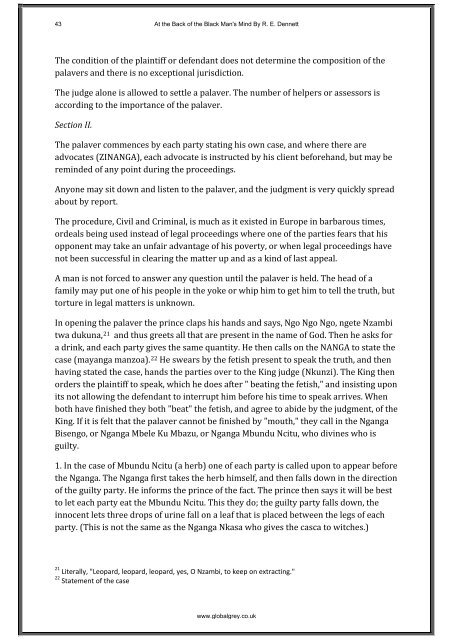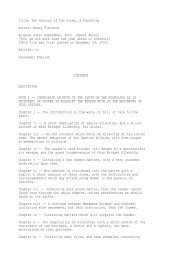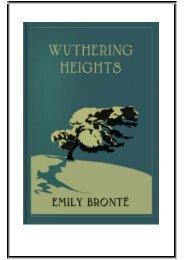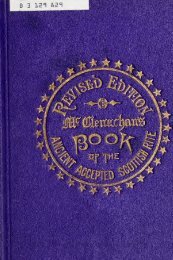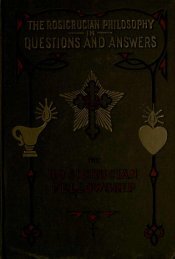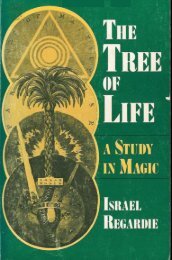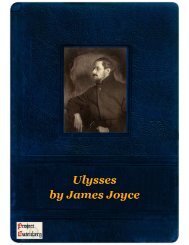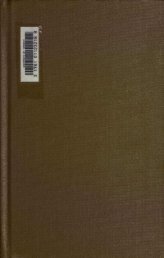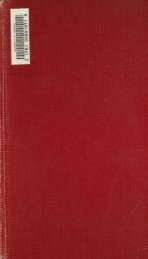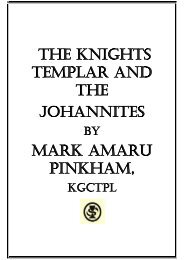Click to download PDF version: 3.87MB - Global Grey
Click to download PDF version: 3.87MB - Global Grey
Click to download PDF version: 3.87MB - Global Grey
Create successful ePaper yourself
Turn your PDF publications into a flip-book with our unique Google optimized e-Paper software.
43 At the Back of the Black Man's Mind By R. E. Dennett<br />
The condition of the plaintiff or defendant does not determine the composition of the<br />
palavers and there is no exceptional jurisdiction.<br />
The judge alone is allowed <strong>to</strong> settle a palaver. The number of helpers or assessors is<br />
according <strong>to</strong> the importance of the palaver.<br />
Section II.<br />
The palaver commences by each party stating his own case, and where there are<br />
advocates (ZINANGA), each advocate is instructed by his client beforehand, but may be<br />
reminded of any point during the proceedings.<br />
Anyone may sit down and listen <strong>to</strong> the palaver, and the judgment is very quickly spread<br />
about by report.<br />
The procedure, Civil and Criminal, is much as it existed in Europe in barbarous times,<br />
ordeals being used instead of legal proceedings where one of the parties fears that his<br />
opponent may take an unfair advantage of his poverty, or when legal proceedings have<br />
not been successful in clearing the matter up and as a kind of last appeal.<br />
A man is not forced <strong>to</strong> answer any question until the palaver is held. The head of a<br />
family may put one of his people in the yoke or whip him <strong>to</strong> get him <strong>to</strong> tell the truth, but<br />
<strong>to</strong>rture in legal matters is unknown.<br />
In opening the palaver the prince claps his hands and says, Ngo Ngo Ngo, ngete Nzambi<br />
twa dukuna, 21 and thus greets all that are present in the name of God. Then he asks for<br />
a drink, and each party gives the same quantity. He then calls on the NANGA <strong>to</strong> state the<br />
case (mayanga manzoa). 22 He swears by the fetish present <strong>to</strong> speak the truth, and then<br />
having stated the case, hands the parties over <strong>to</strong> the King judge (Nkunzi). The King then<br />
orders the plaintiff <strong>to</strong> speak, which he does after " beating the fetish," and insisting upon<br />
its not allowing the defendant <strong>to</strong> interrupt him before his time <strong>to</strong> speak arrives. When<br />
both have finished they both "beat" the fetish, and agree <strong>to</strong> abide by the judgment, of the<br />
King. If it is felt that the palaver cannot be finished by "mouth," they call in the Nganga<br />
Bisengo, or Nganga Mbele Ku Mbazu, or Nganga Mbundu Ncitu, who divines who is<br />
guilty.<br />
1. In the case of Mbundu Ncitu (a herb) one of each party is called upon <strong>to</strong> appear before<br />
the Nganga. The Nganga first takes the herb himself, and then falls down in the direction<br />
of the guilty party. He informs the prince of the fact. The prince then says it will be best<br />
<strong>to</strong> let each party eat the Mbundu Ncitu. This they do; the guilty party falls down, the<br />
innocent lets three drops of urine fall on a leaf that is placed between the legs of each<br />
party. (This is not the same as the Nganga Nkasa who gives the casca <strong>to</strong> witches.)<br />
21<br />
Literally, "Leopard, leopard, leopard, yes, O Nzambi, <strong>to</strong> keep on extracting."<br />
22<br />
Statement of the case<br />
www.globalgrey.co.uk


